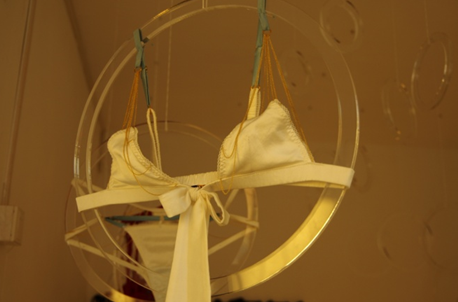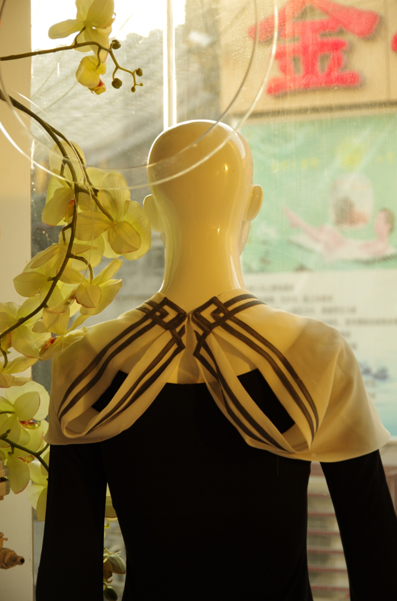It's oh so quiet… Irene Lu
- By Elsbeth van Paridon
 0 Comment(s)
0 Comment(s) Print
Print E-mail China.org.cn, October 31, 2013
E-mail China.org.cn, October 31, 2013
Teahouses and teasers
Even though Communist China may have posed a bump in the til-fashion-season-do-us-part marriage between women and their clothing, things were slightly different before. In ancient China, for example, outer garments symbolized the wearer's social rank and status. Women often opted to express their feelings and sense of individuality through their undergarments by adorning these with their sowing craft and designs. Underneath it all, a woman could (ironically) stand out. The Ming Dynasty (1368-1644) witnessed the surge of the dudou (just think "halter top"); a diamond-shaped cloth with straps running over the shoulders and cinched in on the lower back was the La Perla among well-heeled women. The garment remained chic throughout the Qing Dynasty (1644-1912) until it was replaced by the bra in the 20th century.
Lu deemed 2013 the perfect time to spark a revival. Perfect timing, as the Beijing Municipal government decided to restore the area where her shop was located, also the former red-light district of teahouses and courtesans (think Du Shiniang or Yu Tangchun of the Ming Dynasty (1368-1644)) across the hutongs of Beijing's Qianmen area.
Saucy minx Lu, whose parents hail from Taiwan but was herself born in the Big Apple, attended the city's Fashion Institute of Technology where she majored in lingerie design. She has opted to embrace her Chinese heritage, from dynastical lingerie design to the tiniest hand sown detailing, and give it a purring 21st century impetus. Lu's designs are not of the Amsterdam-provocative window sort, but more of the teaser kind. Think Agent Provocateur meets Zahia Dahar.
|
|
|
The softness of the hand-sown silk meets the soft dangling of harsh chains. |
|
|
|
The shop is located in the ancient hutongs of Beijing's Qianmen area, aka the HQ for this year's Beijing Design Week, aka the ancient glamour district of bustling teahouses and mysterious courtesans |
Robes and ropes
Lu's vision refrains from the Dahar glazed cupcake romanticism or Provocateur's twisted straps, but does share their sense of femininity, strength and sensuality. Just in an in-between edgier, more "out there" as Lu describes it herself, yet soft (literally as all pieces are made of hand sown and -prepared silk) design. She gets her inspiration from the past, the future, the Greek myths, Roman robes (which saw the intricate use of rope across the chest area; Japanese bondage avant la lettre), Chinese religion or women, from plain Jane to svelte Salome -- the actual inspiration for another one of Lu's recent features.
Salome was the daughter of Herodias (1st century B.C.) who got a king to approve her request to behead the prophet (John) who preached the coming of Christ merely through her sensual moves. Salome danced, seduced and caused quite the hedonistic scandal, one that Lu happily used as inspiration. Her detailing of delicately dangling harsh gold chains together with the softness of the silk Lu uses in all of her designs, create an unbreakable, untamable yet sensuous and sensitive woman – "Salome style" indeed. This type of femininity attracts both the foreign as well as the Chinese customer. Fashion and scandal do fuse so very well.
Lu and her silk yarn have now, in her latest "Sshht" collection, also taken on the torso-accentuating ancient dudou and created a modern version, featuring the lines and architectural curves of the old Beijing courtyards (now that's what you call celebrating your curves) and even their color schemes (grey/red). The traditional Chinese embroidery patterns and themes found on the antique dudou designs -- love and lotus flowers -- have also made their way onto the modern version by Lu's needle and thread: she embroiders the brand logo and various loving topics on their inside so that no one from the outside can see. "Ssht."
At least Lu's secret is out. And so is her design: out there.
Fashionistas United:
"What you wear underneath can quietly carry as much luster as what's on show. Sssht."







